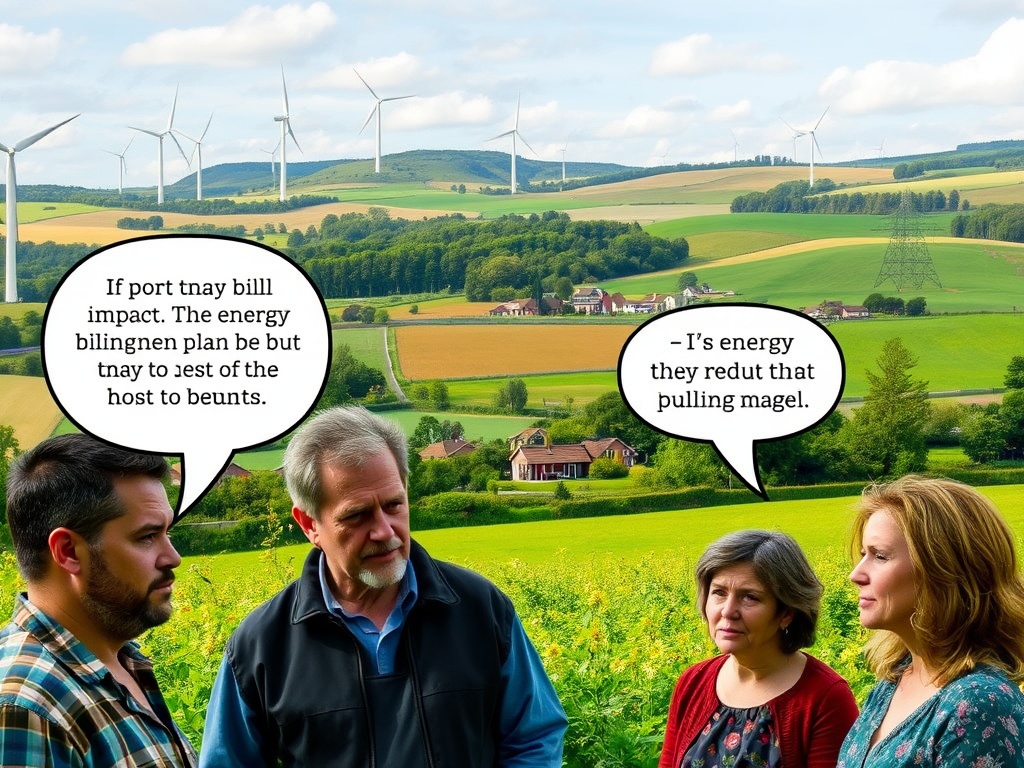Community Outrage Over Government’s Energy Bill Reduction Plan

Residents living in proximity to proposed electricity pylons have expressed their strong discontent regarding a Government initiative aimed at reducing their energy bills by £2,500. Many consider this plan an “insult” when weighed against the anticipated decrease in their property values.
On Monday, the Government unveiled a proposal that would provide households situated within 500 metres of new overhead transmission cables, substations, and major upgrades to existing pylons with a discount of £250 on their energy bills each year for a decade. However, this scheme will not extend to those living near cables and pylons that are already established and not undergoing any upgrades.
The Government’s goal is to ease community concerns regarding the construction of massive new pylon networks throughout Britain, which are deemed essential for efficiently transporting increasing volumes of renewable electricity across the country in order to achieve net-zero targets.
Charlotte Banks, an interior designer residing approximately 500 metres from the proposed 114-mile Norwich to Tilbury pylon route, voiced her frustration. She stated, “With £250 a year for 10 years, you’re not even beginning to address the £200,000 that people might lose due to the devaluation of their homes. It’s a joke.” Banks added that they could potentially lose between £200,000 and £300,000 if they were to sell their house, emphasizing that a home is often the largest investment for individuals, particularly for those in the 60-plus age bracket, as it also serves as their pension. “We are now £300,000 down on our pension. So £250 a year doesn’t really cut it,” she lamented.
She further explained that they were planning to sell their home before the announcement of the pylons, adding, “This is a nimby point of view – I don’t want it here. But I don’t want it in anybody’s back yard either; I don’t think anyone should have to deal with this.”
The Government clarified that the bill reduction is not intended as compensation for any financial or other impacts associated with the project. Instead, it aims to ensure that local communities can directly benefit from supporting the UK in transitioning to greener energy sources.
While some properties may qualify for separate compensation, this mainly pertains to landowners whose land will be used for pylons and other infrastructure. It will not account for any potential decrease in property values or the disruption of scenic views. “We don’t qualify for any compensation because the pylon itself is not on our land – it’s on the neighboring land, but we will see it,” Ms. Banks explained.
In contrast, opponents of the pylons argue that the cables could feasibly be placed underground, thereby minimizing the visual and environmental impact.
Rosie Pearson, who resides near the town of Coggeshall in Essex and is about 500 metres away from an existing pylon, has actively campaigned against the proposed route. She expressed her frustration, stating, “People are incredibly angry about this announcement. They feel it is deeply patronizing and does little to alleviate the harm inflicted by the pylons.”
She further noted that many residents may find it inequitable that those living near existing pylons will not receive any bill reduction. “You could hear people saying, ‘Why should I be impacted by a pylon without getting a discount when others are?’” she remarked.
Moreover, Pearson highlighted the adverse effects on the housing market, stating, “People are trying to buy houses and can’t secure a mortgage due to the pylons. Estate agents are now warning potential buyers to ‘be aware of the pylons’. When I had my house appraised, the first question was about my proximity to the pylon route. It’s a significant concern for those attempting to sell their homes.”
Gareth Presley, an IT support services worker living in Lower Somersham near Ipswich, described the Government’s initiative as “insulting to everyone involved.” He expressed his disappointment, stating, “That’s the only polite way I can put it.”
Deputy Prime Minister and Housing Secretary Angela Rayner responded by saying, “We owe it to the people of this country to get Britain building again. It is no longer a question of whether we build the new infrastructure we need, but rather how this should be done in collaboration with local communities. This Government’s Planning and Infrastructure Bill will reduce energy bills for local people living near new projects, ensuring they benefit as we work towards a more prosperous and energy-secure future for the next generation.”




